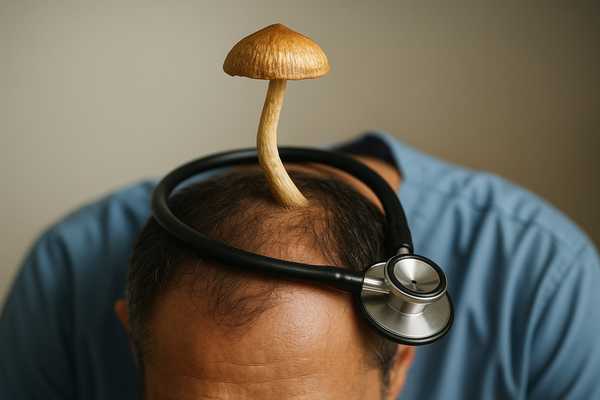Psilocybin + Mindfulness Shows Promise for Healthcare Worker Depression: Report

Psilocybin + Mindfulness Shows Promise for Healthcare Worker Depression: Report
News provided by Huntsman Mental Health Institute
Oct 22, 2025, 11:00 ET
Nearly half (46%) of healthcare workers who received psilocybin and meditation techniques were free of depression at 2 weeks, compared to just 8% who only did meditation
SALT LAKE CITY, Oct. 22, 2025 — Frontline healthcare workers struggling with depression after the COVID-19 pandemic experienced significant relief from a treatment combining group psilocybin therapy with mindfulness training, according to a new study from Huntsman Mental Health Institute at University of Utah Health. Doctors and nurses who received this controlled, group psilocybin therapy along with an eight-week Mindfulness Based Stress Reduction program saw far greater improvements than those who only learned mindfulness techniques.
The study, which originally appeared in PLOS Medicine, included 25 healthcare workers who worked directly with COVID patients and were battling both depression and burnout. Participants were randomized: a select group received a single dose of psilocybin (25 mg) in a controlled clinical setting combined with an eight-week mindfulness training program, while the other half completed the mindfulness training alone. Those treated with the combination therapy had depression scores that dropped by more than twice as much as the meditation-only group, and they reported less emotional exhaustion and greater feelings of connection to themselves and others.
“Depression and burnout have long been serious problems for healthcare workers,” said Benjamin Lewis, MD, associate professor of psychiatry at University of Utah and lead author on the study. “When the pandemic only worsened these effects, we felt it was crucial to try something different to understand how we can help this group of individuals who are dedicated to helping others.”
Nearly half (46%) of healthcare workers who received psilocybin alongside mindfulness techniques were free of depression at two weeks, compared to just 8% who only learned mindfulness practices. The study showed significant sustained improvements in symptoms with a single dose of psilocybin administered at week 6 of the meditation course.
Most psilocybin studies are expensive and hard to scale because they typically use two therapists per patient with individual sessions. This study delivered treatment in groups instead, creating an easier path toward scaling and a more accessible option for healthcare workers seeking relief.
To read the study in PLOS Medicine: https://journals.plos.org/plosmedicine/article?id=10.1371/journal.pmed.1004519
To learn more about psychedelic research at HMHI: https://medicine.utah.edu/psychiatry/research/labs/upsi
For an overview of group-format psilocybin trials, see this TEDx presentation by Benjamin Lewis: https://www.ted.com/talks/benjamin_lewis_could_psychedelics_help_patients_in_therapy
If you or someone you know is struggling with depression, burnout, or another mental health crisis, call or text 988 or visit the Huntsman Mental Health Institute Crisis Care Center at 955 West 3300 South in South Salt Lake.
About Huntsman Mental Health Institute
Huntsman Mental Health Institute at the University of Utah is a first-of-its-kind model created to address one of our nation’s greatest challenges: mental health and substance use disorders. The institute combines the strength of one of America’s leading research universities with the nation’s integrated mental health crisis care model and a comprehensive continuum of care that includes a 161-bed hospital and more than 85 outpatient locations. HMHI educates hundreds of learners every year and provides wide-ranging educational opportunities in psychiatry and mental health. Its research approach uses collaborative, multidisciplinary “teams of teams” to uncover new ways to tackle complex problems. A gift of $150 million from the Huntsman family supports the institute’s mission to advance mental health knowledge, hope, and healing for all.
Learn more at: healthcare.utah.edu/HMHI and join the conversation on Instagram, Facebook, TikTok, X, and LinkedIn.
Source: Huntsman Mental Health Institute
